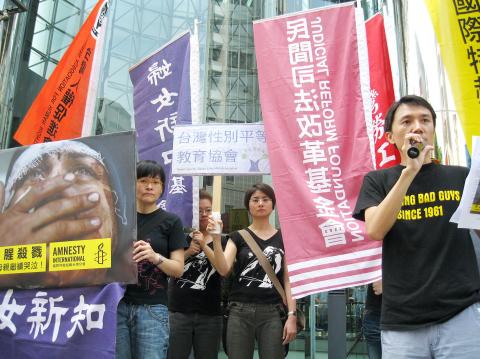Human rights groups yesterday protested outside the Russian representative office in Taipei, condemning what they said was the Moscow-sponsored violence in Syria, while urging the Russian government to suspend arms sales to the Syrian government.
Since the uprising against Syrian President Bashar al-Assad broke out in March last year, more than 14,000 people have reportedly been killed. Many were civilians who died from government artillery and tank shellings, or were shot at close range. Despite the escalation of violence, Moscow continues to sell weapons to its ally in Damascus.
Led by Amnesty International Taiwan, several human rights groups, including the Taiwan Labor Front, the Taiwan Association for Human Rights, the Garden of Hope Foundation and the Awakening Foundation, gathered in front of the Aurora Building, where the Representative Office in Taipei for the Moscow-Taipei Coordination Commission on Economic and Cultural Cooperation — the de facto Russian embassy — is located, and called attention to the bloodshed in Syria.

Photo: Hsieh Wen-hua, Taipei Times
The activists focused on the UN Conference on the Arms Trade Treaty, which is scheduled for next month in New York and expected to come up with an internationally agreed regulation on the global trade in conventional weapons.
According to Amnesty International Taiwan director Yang Tsung-Li (楊宗澧), it is estimated that one person dies from armed violence every minute and that about 26 million people become refugees because of armed conflicts each year.
The world’s largest arms exporters include Russia, China, the US and the UK.
“Even though Taiwan is not a member state of United Nations, Taiwanese should not stay aloof from world affairs. These issues are crucial to us, especially considering the situation between Taiwan and China,” Yang said.
Yesterday was the UN International Day in Support of Victims of Torture and Amnesty International offices worldwide have staged similar events to raise awareness of what has happened in Syria, Yang said.
In Taipei, the protesters shouted the slogans “Stop killing” and “Stop arms sales” in front of the Russian representative office. A dozen activists stayed after the protest and handed out copies of petitions that can be signed and mailed to the Russian Ministry of Foreign Affairs to passersby during lunchtime.
The rights groups originally attempted to submit a letter demanding an immediate suspension of arms transfers to Syria, but the Russian office refused to accept it.

Chinese spouse and influencer Guan Guan’s (關關) residency permit has been revoked for repeatedly posting pro-China videos that threaten national security, the National Immigration Agency confirmed today. Guan Guan has said many controversial statements in her videos posted to Douyin (抖音), including “the red flag will soon be painted all over Taiwan” and “Taiwan is an inseparable part of China,” and expressing hope for expedited reunification. The agency last year received multiple reports alleging that Guan Guan had advocated for armed reunification. After verifying the reports, the agency last month issued a notice requiring her to appear and explain her actions. Guan

GIVE AND TAKE: Blood demand continues to rise each year, while fewer young donors are available due to the nation’s falling birthrate, a doctor said Blood donors can redeem points earned from donations to obtain limited edition Formosan black bear travel mugs, the Kaohsiung Blood Center said yesterday, as it announced a goal of stocking 20,000 units of blood prior to the Lunar New Year. The last month of the lunar year is National Blood Donation Month, when local centers seek to stockpile blood for use during the Lunar New Year holiday. The blood demand in southern Taiwan — including Tainan and Kaohsiung, as well as Chiayi, Pingtung, Penghu and Taitung counties — is about 2,000 units per day, the center said. The donation campaign aims to boost

The Kaohsiung Tourism Bureau audited six hotels in an effort to prevent price gouging ahead of Korean band BTS’ concert tour in the city scheduled for Nov. 19, 21 and 22 this year. The bureau on Friday said that the audits — conducted in response to allegations of unfair pricing posted on social media — found no wrongdoing. These establishments included the local branches of Chateau de Chine, Hotel Nikko, My Humble House, and Grand Hai Lai, it said, adding that the Consumer Protection Commission would have penalized price gougers had the accusations been substantiated. The bureau said the Tourism Development Act

The military yesterday said it has located the flight data recorder, or black box, of an F-16V jet that disappeared off eastern Taiwan earlier this month, and it would soon deploy a salvage team to try to retrieve it. Air Force Command Headquarters said that while it had pinned down the location of the black box, it was still searching for the aircraft’s sole pilot, air force Captain Hsin Po-yi (辛柏毅). Without providing details, the air force said it had located the black box days after detecting some intermittent signals and would now engage a team of professionals to retrieve it. The air